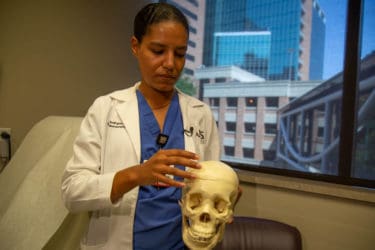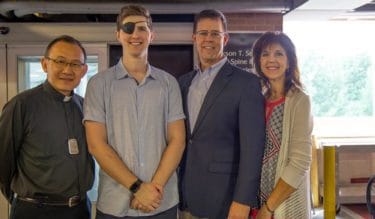View Larger Image

Joshua Moody and his parents, Gwen and David.
Family Finds Faith an Anchor During Recovery From Traumatic Brain Injury
| On the afternoon of November 10, 2017, the temperature hovered just below 60 degrees. A few clouds passed through the sky as a light breeze moved through leaves rich with fall foliage. Joshua Moody, 22, and his father, David, decided they would take advantage of the weather, so after sharing lunch, they went for a drive in Joshua Moody’s sports car around Burns Park.
The road winds up and down hills and has little shoulder. David Moody was driving and wanted to make sure an oncoming vehicle in the opposite lane had enough room, so he shifted a little to the right.
“I over-adjusted and lost control of the car and left the road,” David Moody said. “There was a tree immediately off the pavement, and I had a split second to make a decision. The only thing I could think was to make sure that the tree hit more on my side of the car than Joshua’s. I wanted to avoid as much injury to him as possible.”
After the collision, Moody noticed his son was lying unconscious beside him. Neither of them could move, and the car was severely damaged. First responders arrived within minutes of a witness dialing 911.
Gwen Moody was at work when she received a call from her husband about the accident.
“Even before he told me, I could already tell something was wrong,” she said.
She asked a friend to drive her to the UAMS emergency department right away.
The men arrived in two separate ambulances. David Moody’s pelvis had been broken in multiple places. Orthopaedic trauma surgeon Steven Cherney, M.D. placed screws and a metal plate to repair it. Moody says his pain was minimal considering the circumstances. He’s grateful for that because it allowed him to focus on his son’s recovery. Joshua Moody had a traumatic brain injury.
“We categorize traumatic brain injury into three levels: mild, moderate and severe,” said Analiz Rodriguez, M.D., Ph.D., assistant professor and neurosurgeon in the Jackson T. Stephens Spine & Neurosciences Institute. “Mr. Moody’s was severe.”
In the days following the accident, Joshua Moody progressed well in the intensive care unit. He could give a thumbs-up and obey simple commands like lifting the number of fingers matching the physicians’ prompt.
“We were very encouraged at that point,” Gwen Moody said. “But on the fourth or fifth day, very early in the morning, maybe 2 a.m., one of the nurses came in and noticed an indication that his brain was swelling.”
Joshua Moody had to have emergency surgery, a craniectomy. Rodriguez removed part of his skull to relieve pressure. It’s a procedure not uncommon in patients with traumatic brain injury.
“When the brain swells, it doesn’t have anywhere to go,” Rodriguez said. “That can cause further, sometimes irreversible injury. We remove a side of the skull. In Joshua’s case, we had to remove bone flaps on both sides of his skull because his brain was swelling on both sides.”
The days following the craniectomy felt like weeks to Gwen and David Moody, but their hope increased with Joshua’s steady progression. The Moodys are devout Catholics and leaned on their faith for strength. Father Joseph Chan is the associate pastor of Cathedral of St. Andrew in Little Rock and St. Patrick Catholic Church in North Little Rock. He’s Rodriguez’ priest and, through her, became acquainted with the Moody family.
“I believe we were pulled together in divine providence,” Chan said. “Spirituality lives in us if we can recognize its presence. Our faith brings growth, solidarity and makes us stronger.”
Chan is a former physician and director of a hospice center in Fort Smith. He suffered a traumatic brain injury five years ago in a car wreck. Chan doesn’t believe it was a coincidence that he came to know and minister to the Moody family.
“In spite of the tragedy, I think it became a gift for all of us. It was an honor and a privilege to be a witness to his healing,” Chan said.
During his month-long stay at UAMS, Joshua Moody saw physical, occupational and speech therapists. Rodriguez says that helped in his recovery before he went to a Houston rehabilitation center in December. He came back home May 13, 2018 — Mother’s Day.
“Joshua’s age and the timing of his intervention were instrumental in his recovery,” Rodriguez said. “The nurse was highly trained and able to quickly pick up on the changes in his brain activity overnight. We were able to intervene with surgery within an hour of noticing that change and prevent him from having irreversible brain damage.”
Joshua Moody lives on his own now and is back to work developing software and websites for individuals and small businesses. He says it’s interesting to look back through the past year and see how events start to piece together in his memory as he became more aware of his surroundings.
“I started to have five to10 seconds of memory here and there. Then it increased to 20-30 seconds, then 10 minutes,” Moody said. “Finally, I was able to understand what was going on around me while I was in rehab and everything that had happened up to that point.”
He’s grateful for his support system.
“It’s important to understand how much you can really lean on family and friends when you need them for strength.”
The Moody family says they learned a lot about traumatic brain injury, patience and trials over the past several months. The nurses and doctors not only delivered great care, David Moody says, they also took time with the family and listened as they poured out their hearts.
As the days become shorter and the leaves start to change colors, the Moody family is overwhelmed with gratitude following that life-changing experience last fall. David Moody is writing a book to document the experience and how it strengthened his patience and faith.
“We all day-to-day go 100 miles per hour with our hair on fire,” he said. “We rarely stop to appreciate what we have in terms of blessings and people around us. There are so many simple things we don’t account for or appreciate. Hopefully, I’m better at that now. My faith is stronger, deeper and I’m going to pay it forward. We have to realize we don’t have control over what’s happening around us, so you have to have an anchor. Our faith was our anchor.”


